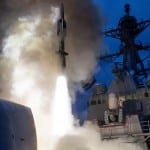NGI Proposals In. Missile Defense Agency (MDA) director Vice Adm. Jon Hill confirmed industry has finished submitting proposals for the Next Generation Interceptor (NGI) for the Ground-based Midcourse Defense system and the government has started the source selection process. “We had a very short delay in getting the RFP out and a very short delay based on feedback from industry to actually provide those bids- but they are on the table now and we are doing source selection,” Hill said during a virtual Heritage Foundation event on Aug. 18. He thinks there are avenues to speed up NGI development. “I’m probably the most impatient guy on the planet when it comes to that. So we’re leveraging competition and I tell you, industry always stuns me with the kind of innovation.” Hill underscored that once MDA goes through the bids, the interceptor schedule might get accelerated. “We’re going to be able to do this faster – so that’s one of the benefits of competition. And so we’re going to know more. We don’t know enough today because those bids actually landed last week and so we have work to do to get to the award and really understand what the true schedule will be.” MDA currently expects to have the first NGI placed in a missile field in Alaska in 2018, following testing.
Biden Endorsements. Over 70 former Republican national security officials have endorsed Democratic nominee Joe Biden for president, calling Donald Trump “dangerously unfit to serve another term.” The group includes several former members of the Trump administration, such as Miles Taylor, who served as the Department of Homeland Security chief of staff, and Elizabeth Neumann, who was DHS assistant secretary. The statement was also signed by John Negroponte, the first Director of National Intelligence, and William Webster, the former FBI and CIA director. “While some of us hold policy positions that differ from those of Joe Biden and his party, the time to debate those policy differences will come later. For now, it is imperative that we stop Trump’s assault on our nation’s values and institutions and reinstate the moral foundations of our democracy,” the officials write in the statement.
UAS for UAE. The proposed sale of 20 Boeing InSitu RQ-21A Blackjack unmanned aircraft systems (UAS) for $80 million to the United Arab Emirates, along with $12 million worth of InSitu ScanEagle drones, has not gone forward, Boeing InSitu says. Those sales were part of an approved $8 billion “emergency” arms sale to Saudi Arabia and the UAE in May last year for the Saudi-led war against Houthi forces in Yemen. On Aug. 21, the State Department declined to release which of the 22 approved sales have proceeded with deliveries, but House Foreign Affairs Committee Chairman Eliot Engel, D-N.Y., pointed to a State Department Office of Inspector General report last month, which noted that most had not, and said that only four of the 22 had been fully delivered, that another five would not even start delivery until this year or later, and that some of the agreements were not signed by the time of the OIG’s report. Those sales include a number of precision guided munitions, including nearly $1.6 billion for Lockheed Martin and Raytheon Paveway and Enhanced Paveway PGMs for the Royal Saudi Air Force F-15, Tornado, and Eurofighter aircraft; $900 million for BAE Systems’ Advanced Precision Kill Weapon System for the UAE; nearly $685 million for Raytheon AGM-65 Maverick PGMs, Paveway and Enhanced Paveways for the UAE. The State Department OIG report last month said that “the most critical equipment” bought under Direct Commercial Sales occurred in “the near-immediate aftermath” of the emergency certification. Lawmakers have raised concerns about civilian casualties caused by PGMs in Yemen.
Drone Detection at Airports: The Federal Aviation Administration last Friday released a solicitation for vendors to participate in a capabilities evaluation, testing their ability to detect and mitigate unwanted drones near airports without interfering with surrounding communications and other systems. In the coming weeks, the agency will also solicit airports where tests will be conducted. The culmination of this effort will be standards that airports can use to procure appropriate drone monitoring and mitigation systems. Companies interested in submitting proposals have 45 days to respond to the announcement.
Army/Space Command. The Army announced August 21 that Army Space and Missile Defense Command (USASMDC) will serve as its service component for the new U.S. Space Command. USASMDC will retain its responsibilities as the service component to U.S. Strategic Command. “The Army is the largest user of space-enabled systems in the Department of Defense. Naming USASMDC as a component command to both combatant commands strengthens command and control, unity of effort, and synchronization of Army space and missile defense operations,” Army Secretary Ryan McCarthy said in a statement. Lt. Gen. Daniel Karbler currently leads USASMDC, which oversees the Army’s space and missile defense elements and is co-headquartered at Redstone Arsenal in Alabama and Colorado Springs, Colorado.
Passing the Baton. U.S. Air Force Gen. Glen VanHerck is assuming the reigns of North American Aerospace Defense Command (NORAD) from his predecessor, Air Force Gen. Terrance O’Shaughnessy. Among the latter’s accomplishments, “he accelerated our Joint All Domain Command and Control, or JADC2, efforts for homeland defense, and led two demonstrations of this ability to share sensor and shooter data across the joint force,” Defense Secretary Mark Esper said in a Colorado ceremony on Aug. 20. “General O’Shaughnessy’s leadership postured NORAD for the effective intercept of more than 20 Russian aircraft in our Arctic approaches, and readied both commands to confront any escalation in North Korean strategic missile launch activity.”
Appointments. CACI International has named former CAE and Raytheon executive Todd Probert as president of its National Security and Innovative Solutions Sector, which provides services and technology to defense, intelligence and federal civilian customers. Prior to joining CACI in July, Probert spent six months at CAE as president of the Defense and Security business. He spent about 10 years with Raytheon, most recently as vice president of the Command and Control, Space and Intelligence business. Aerojet Rocketdyne has appointed Audrey McNiff to its board, increasing the number of directors from seven to eight. She recently retired as a partner at Goldman Sachs as Head of Foreign Exchange Sales and Derivatives in the Securities Division. And Kaman Corp. says that Neal Keating, president and CEO, is retiring in 2021 and will be succeeded by Ian Walsh as of Sept. 8. Walsh previously was chief operating officer of REV Group, a designer and manufacturer of specialty vehicles and related aftermarket parts and services. He also worked at Textron, leading its TRU Simulation and Training business.
…New HSAC Members. Acting Homeland Security Secretary Chad Wolf last week announced three new members of the Homeland Security Advisory Council (HSAC), which provides the secretary with independent recommendations on homeland security issues. The new members are John Clark, CEO of the National Center for Missing & Exploited Children and former director of the U.S. Marshals Service; Sharon Cooper, a developmental and forensic pediatrician who evaluates and treats children who have been victims of abuse; and Daniel Kaniewski, managing director, Public Sector at Marsh & McLennan Companies and a former deputy administrator for Resilience at the Federal Emergency Management Agency.
…And ASAC Members. Transportation Security Administration Administrator David Pekoske has added four new members to the Aviation Security Advisory Committee (ASAC), which is comprised of aviation industry stakeholders. From the general aviation community, Pekoske appointed Sarah Wolf of the National Business Aviation Association and Joe Dalton of the National Air Transport Association. The other new members are Eric Lipp of Open Doors Organization, which advocates for people with disabilities in travel and tourism, and Alexander Rodriguez from the security screening company MSA Security.
A Mighty Wind. Following a derecho that smacked parts of Iowa on Aug. 10, including the Cedar Rapids area where BAE Systems and Raytheon Technologies have operations, the companies were basically back to full operations by last week. BAE says it “implemented robust business continuity plans and our operations have been restored to full capacity.” Collins Aerospace, one of Raytheon Technologies four operating segments, says it has resumed the majority of production operations in the region but some buildings are closed due to damage and power outages.
COVID Relief Sought. Industry groups representing the nation’s airports and security detection equipment manufactures are asking congressional leaders to support security equipment funding for the Transportation Security Administration in the next COVID-19 relief bill. To restore public confidence in aviation so that is safe to fly without fear of contracting the novel coronavirus, the groups says they support a Senate relief bill that would provide $208 million to TSA for advanced security screening technologies that protect the air transportation system from threats and also travelers, security officers and other front line workers from COVID through contactless screening. “Our nation’s aviation system is the pulse of our nation, and the gateway to economic progress in an interconnected world,” says the Aug. 17 letter from the Security Manufacturers Coalition and airport groups. “With the right investments, we can continue to provide Americans safe and secure travel options that allow us to stay connected and that facilitate economic growth throughout America.”
Threat Isolation. The Defense Information Systems Agency has selected By Light Professional IT Services for a $198.9 million Other Transaction Authority (OTA) to support the Pentagon’s Cloud Based Internet Isolation program. “This OTA moves non-mission-essential internet browsing off of the endpoint to a cloud-based environment. By doing so, it significantly reduces the risk and attack surface of the Department of Defense Information Networks and relieves congestion at the internet access points,” DISA officials wrote in a statement. The threat isolation capability works by transferring potentially malicious code to a secure, isolated cloud platform where it can be separated from direct connections to DoD networks, according to DISA.

 By
By 











